Unit 12 Life is full of the unexpected Section A 3 (Grammar focus-4c)课件(27张PPT)
文档属性
| 名称 | Unit 12 Life is full of the unexpected Section A 3 (Grammar focus-4c)课件(27张PPT) | 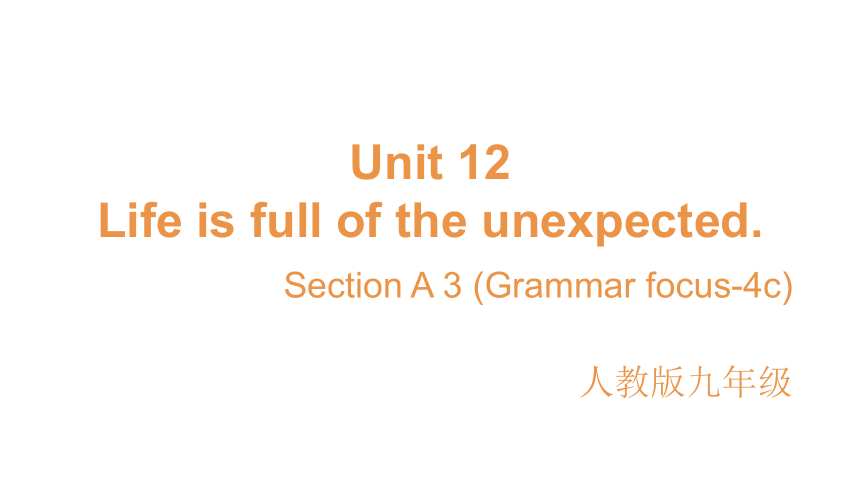 | |
| 格式 | pptx | ||
| 文件大小 | 900.1KB | ||
| 资源类型 | 教案 | ||
| 版本资源 | 人教新目标(Go for it)版 | ||
| 科目 | 英语 | ||
| 更新时间 | 2023-09-14 19:32:43 | ||
图片预览

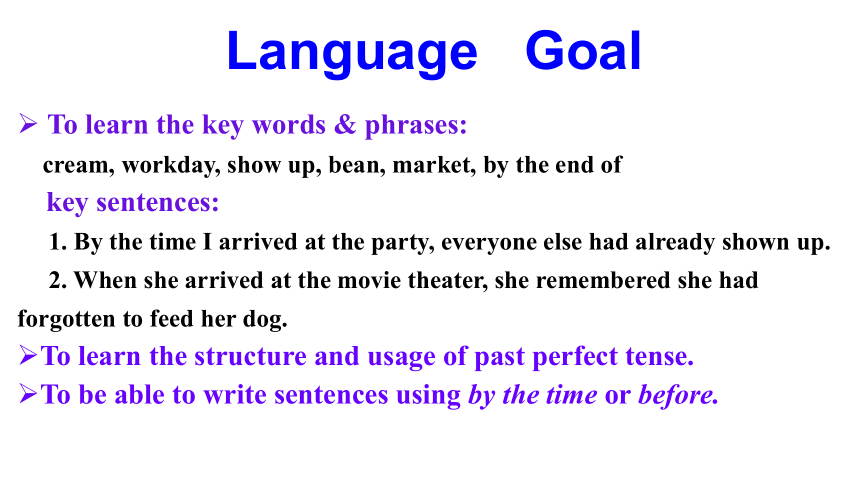
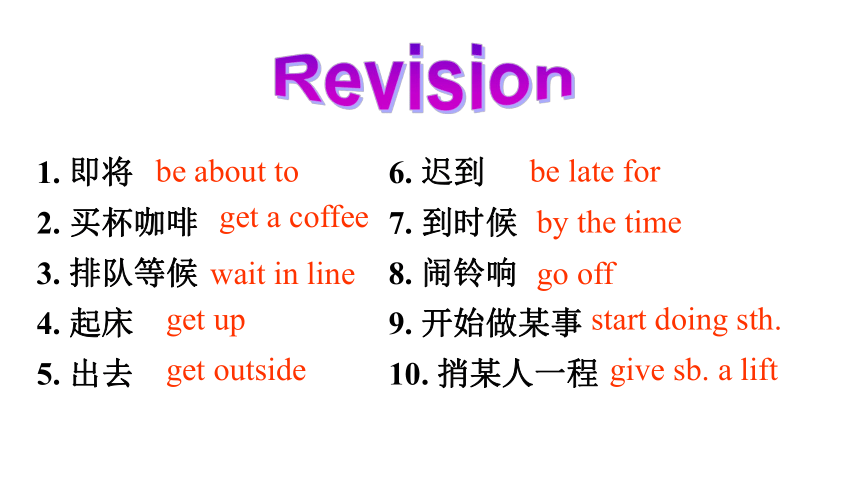
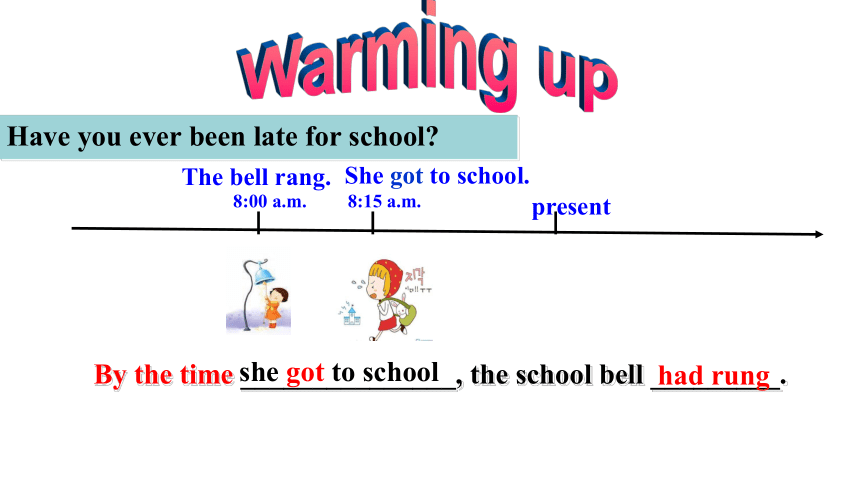
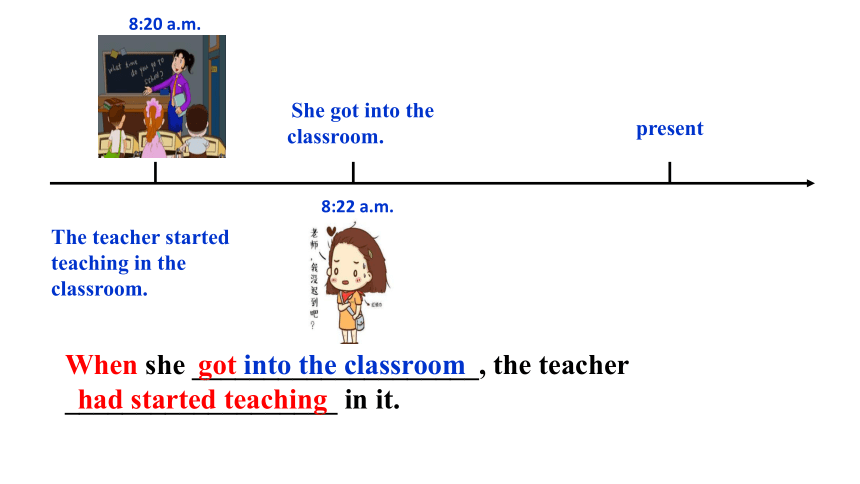
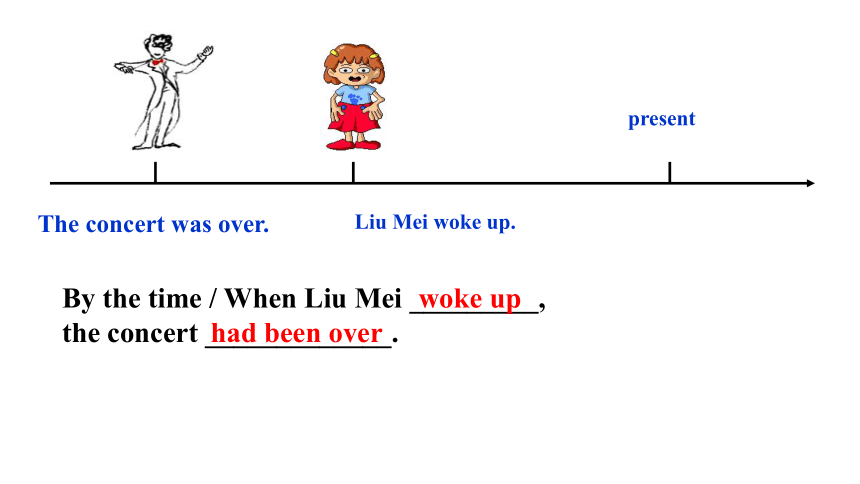
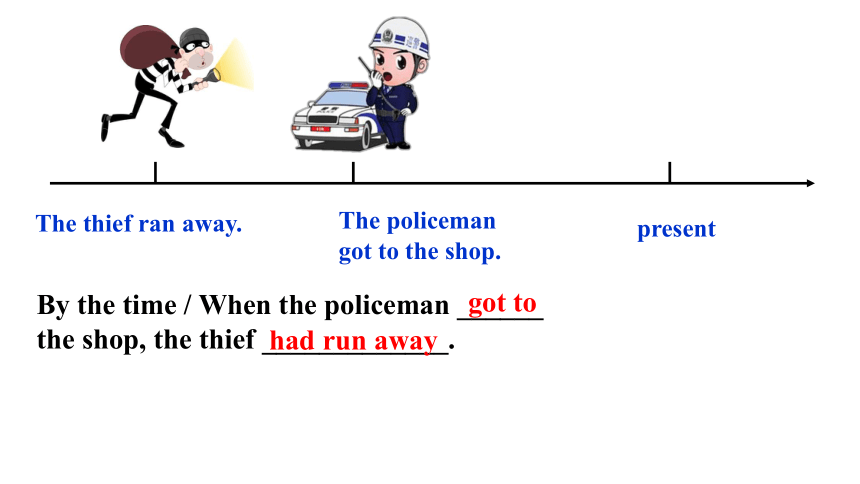
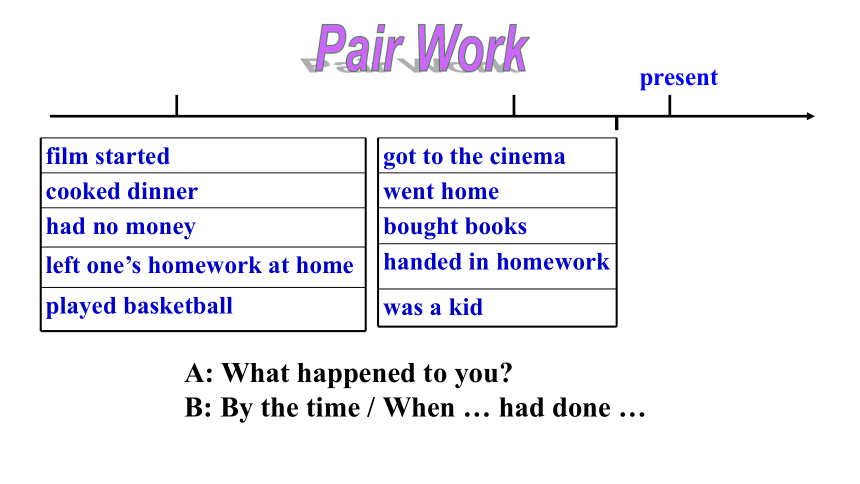
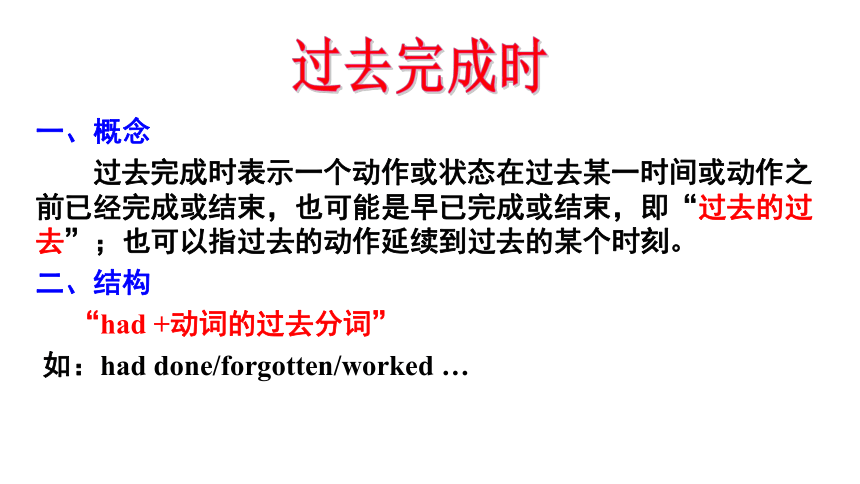
文档简介
(共27张PPT)
Unit 12
Life is full of the unexpected.
Section A 3 (Grammar focus-4c)
人教版九年级
Language Goal
To learn the key words & phrases:
cream, workday, show up, bean, market, by the end of
key sentences:
1. By the time I arrived at the party, everyone else had already shown up.
2. When she arrived at the movie theater, she remembered she had forgotten to feed her dog.
To learn the structure and usage of past perfect tense.
To be able to write sentences using by the time or before.
1. 即将
2. 买杯咖啡
3. 排队等候
4. 起床
5. 出去
6. 迟到
7. 到时候
8. 闹铃响
9. 开始做某事
10. 捎某人一程
get outside
get up
wait in line
get a coffee
be about to
be late for
by the time
go off
start doing sth.
give sb. a lift
Revision
Have you ever been late for school
By the time _______________, the school bell _________.
she got to school
present
The bell rang.
8:00 a.m.
had rung
She got to school.
8:15 a.m.
Warming up
She got into the
classroom.
The teacher started teaching in the classroom.
When she ____________________, the teacher ___________________ in it.
had started teaching
got into the classroom
8:22 a.m.
8:20 a.m.
present
Liu Mei woke up.
The concert was over.
By the time / When Liu Mei _________,
the concert _____________.
woke up
had been over
present
The policeman got to the shop.
The thief ran away.
By the time / When the policeman ______
the shop, the thief _____________.
got to
had run away
present
present
A: What happened to you
B: By the time / When … had done …
film started
cooked dinner
had no money
left one’s homework at home
played basketball
got to the cinema
went home
bought books
handed in homework
was a kid
Pair Work
一、概念
过去完成时表示一个动作或状态在过去某一时间或动作之前已经完成或结束,也可能是早已完成或结束,即“过去的过去”;也可以指过去的动作延续到过去的某个时刻。
二、结构
“had +动词的过去分词”
如:had done/forgotten/worked …
过去完成时
三、用法
表示过去某一时间或动作之前已经发生或完成的动作或存在的状态。句中常用by, before, when, until等词引导时间状语。
它是以过去某一时间为起点,所以过去完成时是一个相对的时态,表示的是“过去的过去”。只有和过去某时间或某动作相比较时才能用到它。
例: Most of the guests had left when he arrived at the party.
当他到达晚会时,他发现大多数客人已经离开了。
2. 过去完成时还可表示过去某一时刻之前发生的动作或状态持续到过去某个时间或持续下去,常与for, since等词连用。
例: When Jack arrived, Mary had been away for almost an hour.
当杰克到时,玛丽已经离开快一个小时了。
1)当我到达学校的时候,我才意识到我把书包忘在家里了。
_______ I got to school, I realized that I
______ ______ my backpack at home.
2)到我返回学校的时候,铃声已经响过了。
_____ _____ _____ I got back to school, the bell ______ _______.
When
had
left
By the time
had rung
根据汉语提示完成句子。
Grammar Focus
3)我到达公共汽车站之前, 汽车已经离开了。
Before I _____ _____ the bus stop, the
bus ______ _______ _______.
4)我决定先买一杯咖啡,然后再去办公室。
I ______ ______ ______ go up to my office when I decided to get a coffee first.
got to
had
already left
was about to
5)就在我和别的工作人员一起排队等候的时候,听到了一个巨大的声响。
As I ______ _______ ______ ______ with other office workers, I ______ _____ _____ ______.
was waiting in line
heard a loud sound
by the time 的用法
by the time 意为 “到……时候(为止)”,是一个介词短语,句中常起到连词的作用,引导时间状语从句。
如果从句中的谓语动词是一般过去式,那么主句的谓语动词通常用过去完成时,表示“截止到从句动作发生时,主句动作已经完成,即过去的过去”。
例:By the time you came back, I had finished this book.
2. 如果从句中的谓语动词为一般现在时或现在完成时,那么主句中的谓语动词常用将来完成时,表示“截止到将来的某一时刻为止,主句动作将已完成。”
例:By the time I get home, they will have left.
By the time I graduate next year, I will have lived here for five years.
(1) by the end of +时间点意为“到……结束时”
① +过去的时间点,主句用过去完成时;
例:By the end of last year, I had stayed in Xi’an for seven years.
② +将来的时间点, 主句用将来完成时;
例:By the end of next month, I will have finished my new book.
拓展
(2) by+时间点意为“到……为止;截止……时”
① +现在的时间点,主句用现在完成时;
例:By now, I have finished all my homework.
② +过去的时间点,主句用过去完成时;
例:By yesterday, the building had been completed.
③ +将来的时间点,主句用将来完成时。
例:By tomorrow, all the students will have been out of the school.
4a
Make sentences using by the time or before.
1. Tim went into the bathroom. Mary got up.
By the time Mary got up, Tim had already gone into the
bathroom.
2. The coffee became cold. I put cream (n. 奶油) in the coffee.
____________________________________________________
3. The teacher collected the math homework. I got to school.
____________________________________________________
________________
Before I put cream in the coffee, the coffee had become cold.
By the time I got to school, the teacher had collected the math homework.
4. I completed the work for my boss. The workday (n. 工作日) ended.
____________________________________________________
5. The movie started. I arrived at the cinema.
___________________________________________________
6. My mother finished making the apple pie (n. 果馅派). I got home
from my language course.
_____________________________________________________
_____________________________________________________
The movie had started, before I arrived at the cinema.
By the time I got home from my language course, my mother had finished making the apple pie.
I had completed the work for my boss before the workday ended.
rush out, forget, arrive at, go into, show up (赶到;露面), find out
4b
Fill in the blanks with the correct forms of the words in the box.
1. By the time I arrived at the party, everyone else _____ already __________.
2. When he put the noodles into a bowl, he realized he ____________ to add the green beans (n. 豆).
3. By the time my mother came back from the market (n. 市场), I ____ already __________ of the door to go to my piano lesson.
shown up
had
had forgotten
had
rushed out
4. Before she got to the airport, she ____________ about the earthquake.
5. When she _________ the movie theater, she remembered she had forgotten to feed her dog.
6. Before she got a chance to say goodbye, he ____________ the building.
arrived at
had gone into
had found out
4c
Write two true statements and one false statement about your day yesterday. Then ask your classmates to guess the false statement.
1. By the time I left for school in the morning, _______________________________________________
_______________________________________________
2. By the end of the school day,
_______________________________________________
_______________________________________________
_______________________________________________
I had already had breakfast.
I had already had my hair cut.
I had finished my homework.
I had gotten a present from Tom.
I had had these articles read.
4c
Write two true statements and one false statement about your day yesterday. Then ask your classmates to guess the false statement.
3. By dinner time,
I ___________________________________________
I ___________________________________________
I ___________________________________________
had had too many apples.
had eaten plenty of meat.
had had all the housework finished.
Exercises
用括号里所给词的适当形式填空。
1. When Tim got back home, he started to realize that the thief ___________ (come) to his house.
2. By the time I received the letter, I ____________ (tell) the content of it.
had come
had been told
Exercises
翻译下列句子。
1. 当他到达学校的时候,老师已经开始上课了。
______________________________________________
______________________________________________
2. 当我出来的时候,我爸爸已经离开家了。
______________________________________________
By the time he got to school, the teacher had already started teaching.
When I got outside, my father had left home.
Exercises
翻译下列句子。
3. 在我拿书包以前我把门锁上了。
______________________________________________
4. 在她做完作业之前我妈妈已经回来了。
______________________________________________
______________________________________________
Before I got my schoolbag, I had locked the door.
Before she finished her homework, my mother had already been back.
1. 复习Grammar Focus 中的内容。
Try to make sentences with before, by the time and be doing … when, and make use of the past perfect tense.
2. 写作:描述一次难忘的经历。
Unit 12
Life is full of the unexpected.
Section A 3 (Grammar focus-4c)
人教版九年级
Language Goal
To learn the key words & phrases:
cream, workday, show up, bean, market, by the end of
key sentences:
1. By the time I arrived at the party, everyone else had already shown up.
2. When she arrived at the movie theater, she remembered she had forgotten to feed her dog.
To learn the structure and usage of past perfect tense.
To be able to write sentences using by the time or before.
1. 即将
2. 买杯咖啡
3. 排队等候
4. 起床
5. 出去
6. 迟到
7. 到时候
8. 闹铃响
9. 开始做某事
10. 捎某人一程
get outside
get up
wait in line
get a coffee
be about to
be late for
by the time
go off
start doing sth.
give sb. a lift
Revision
Have you ever been late for school
By the time _______________, the school bell _________.
she got to school
present
The bell rang.
8:00 a.m.
had rung
She got to school.
8:15 a.m.
Warming up
She got into the
classroom.
The teacher started teaching in the classroom.
When she ____________________, the teacher ___________________ in it.
had started teaching
got into the classroom
8:22 a.m.
8:20 a.m.
present
Liu Mei woke up.
The concert was over.
By the time / When Liu Mei _________,
the concert _____________.
woke up
had been over
present
The policeman got to the shop.
The thief ran away.
By the time / When the policeman ______
the shop, the thief _____________.
got to
had run away
present
present
A: What happened to you
B: By the time / When … had done …
film started
cooked dinner
had no money
left one’s homework at home
played basketball
got to the cinema
went home
bought books
handed in homework
was a kid
Pair Work
一、概念
过去完成时表示一个动作或状态在过去某一时间或动作之前已经完成或结束,也可能是早已完成或结束,即“过去的过去”;也可以指过去的动作延续到过去的某个时刻。
二、结构
“had +动词的过去分词”
如:had done/forgotten/worked …
过去完成时
三、用法
表示过去某一时间或动作之前已经发生或完成的动作或存在的状态。句中常用by, before, when, until等词引导时间状语。
它是以过去某一时间为起点,所以过去完成时是一个相对的时态,表示的是“过去的过去”。只有和过去某时间或某动作相比较时才能用到它。
例: Most of the guests had left when he arrived at the party.
当他到达晚会时,他发现大多数客人已经离开了。
2. 过去完成时还可表示过去某一时刻之前发生的动作或状态持续到过去某个时间或持续下去,常与for, since等词连用。
例: When Jack arrived, Mary had been away for almost an hour.
当杰克到时,玛丽已经离开快一个小时了。
1)当我到达学校的时候,我才意识到我把书包忘在家里了。
_______ I got to school, I realized that I
______ ______ my backpack at home.
2)到我返回学校的时候,铃声已经响过了。
_____ _____ _____ I got back to school, the bell ______ _______.
When
had
left
By the time
had rung
根据汉语提示完成句子。
Grammar Focus
3)我到达公共汽车站之前, 汽车已经离开了。
Before I _____ _____ the bus stop, the
bus ______ _______ _______.
4)我决定先买一杯咖啡,然后再去办公室。
I ______ ______ ______ go up to my office when I decided to get a coffee first.
got to
had
already left
was about to
5)就在我和别的工作人员一起排队等候的时候,听到了一个巨大的声响。
As I ______ _______ ______ ______ with other office workers, I ______ _____ _____ ______.
was waiting in line
heard a loud sound
by the time 的用法
by the time 意为 “到……时候(为止)”,是一个介词短语,句中常起到连词的作用,引导时间状语从句。
如果从句中的谓语动词是一般过去式,那么主句的谓语动词通常用过去完成时,表示“截止到从句动作发生时,主句动作已经完成,即过去的过去”。
例:By the time you came back, I had finished this book.
2. 如果从句中的谓语动词为一般现在时或现在完成时,那么主句中的谓语动词常用将来完成时,表示“截止到将来的某一时刻为止,主句动作将已完成。”
例:By the time I get home, they will have left.
By the time I graduate next year, I will have lived here for five years.
(1) by the end of +时间点意为“到……结束时”
① +过去的时间点,主句用过去完成时;
例:By the end of last year, I had stayed in Xi’an for seven years.
② +将来的时间点, 主句用将来完成时;
例:By the end of next month, I will have finished my new book.
拓展
(2) by+时间点意为“到……为止;截止……时”
① +现在的时间点,主句用现在完成时;
例:By now, I have finished all my homework.
② +过去的时间点,主句用过去完成时;
例:By yesterday, the building had been completed.
③ +将来的时间点,主句用将来完成时。
例:By tomorrow, all the students will have been out of the school.
4a
Make sentences using by the time or before.
1. Tim went into the bathroom. Mary got up.
By the time Mary got up, Tim had already gone into the
bathroom.
2. The coffee became cold. I put cream (n. 奶油) in the coffee.
____________________________________________________
3. The teacher collected the math homework. I got to school.
____________________________________________________
________________
Before I put cream in the coffee, the coffee had become cold.
By the time I got to school, the teacher had collected the math homework.
4. I completed the work for my boss. The workday (n. 工作日) ended.
____________________________________________________
5. The movie started. I arrived at the cinema.
___________________________________________________
6. My mother finished making the apple pie (n. 果馅派). I got home
from my language course.
_____________________________________________________
_____________________________________________________
The movie had started, before I arrived at the cinema.
By the time I got home from my language course, my mother had finished making the apple pie.
I had completed the work for my boss before the workday ended.
rush out, forget, arrive at, go into, show up (赶到;露面), find out
4b
Fill in the blanks with the correct forms of the words in the box.
1. By the time I arrived at the party, everyone else _____ already __________.
2. When he put the noodles into a bowl, he realized he ____________ to add the green beans (n. 豆).
3. By the time my mother came back from the market (n. 市场), I ____ already __________ of the door to go to my piano lesson.
shown up
had
had forgotten
had
rushed out
4. Before she got to the airport, she ____________ about the earthquake.
5. When she _________ the movie theater, she remembered she had forgotten to feed her dog.
6. Before she got a chance to say goodbye, he ____________ the building.
arrived at
had gone into
had found out
4c
Write two true statements and one false statement about your day yesterday. Then ask your classmates to guess the false statement.
1. By the time I left for school in the morning, _______________________________________________
_______________________________________________
2. By the end of the school day,
_______________________________________________
_______________________________________________
_______________________________________________
I had already had breakfast.
I had already had my hair cut.
I had finished my homework.
I had gotten a present from Tom.
I had had these articles read.
4c
Write two true statements and one false statement about your day yesterday. Then ask your classmates to guess the false statement.
3. By dinner time,
I ___________________________________________
I ___________________________________________
I ___________________________________________
had had too many apples.
had eaten plenty of meat.
had had all the housework finished.
Exercises
用括号里所给词的适当形式填空。
1. When Tim got back home, he started to realize that the thief ___________ (come) to his house.
2. By the time I received the letter, I ____________ (tell) the content of it.
had come
had been told
Exercises
翻译下列句子。
1. 当他到达学校的时候,老师已经开始上课了。
______________________________________________
______________________________________________
2. 当我出来的时候,我爸爸已经离开家了。
______________________________________________
By the time he got to school, the teacher had already started teaching.
When I got outside, my father had left home.
Exercises
翻译下列句子。
3. 在我拿书包以前我把门锁上了。
______________________________________________
4. 在她做完作业之前我妈妈已经回来了。
______________________________________________
______________________________________________
Before I got my schoolbag, I had locked the door.
Before she finished her homework, my mother had already been back.
1. 复习Grammar Focus 中的内容。
Try to make sentences with before, by the time and be doing … when, and make use of the past perfect tense.
2. 写作:描述一次难忘的经历。
同课章节目录
- Unit 1 How can we become good learners.
- Section A
- Section B
- Unit 2 I think that mooncakes are delicious!
- Section A
- Section B
- Unit 3 Could you please tell me where the restroom
- Section A
- Section B
- Unit 4 I used to be afraid of the dark.
- Section A
- Section B
- Unit 5 What are the shirts made of?
- Section A
- Section B
- Review of Units 1-5
- Unit 6 When was it invented?
- Section A
- Section B
- Unit 7 Teenagers should be allowed to choose their
- Section A
- Section B
- Unit 8 It must belong to Carla.
- Section A
- Section B
- Unit 9 I like music that I can dance to.
- Section A
- Section B
- Unit 10 You're supposed to shake hands.
- Section A
- Section B
- Review of Units 6-10
- Unit 11 Sad movies make me cry.
- Section A
- Section B
- Unit 12 Life is full of the unexpected
- Section A
- Section B
- Unit 13 We're trying to save the earth!
- Section A
- Section B
- Unit 14 I remember meeting all of you in Grade 7.
- Section A
- Section B
- Review of Units 11-14
